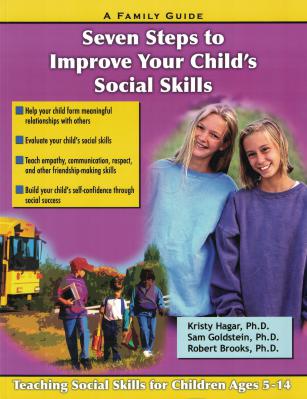Summary
In this seven step workbook, authors Kristy Hagar, Sam Goldstein, and Robert Brooks team up to guide parents as they write about practical strategies to improve a child's social development. This book is complete with scales to evaluate your child's social behavior and practical activities to help you behave appropriately in social situations. Guided by current research and the vast clinical experience of the authors, this workbook helps parents, educators, and health-care workers understand which critical social skills determine future success and how to incorporate the teaching of those skills into everyday life. Practical advice emphasizes building children's resilience and self-esteem and appreciating their own strengths and the strengths of others. Two addenda focus on specific socialization issues faced by educators and health-care workers.
Reviews
"In recent years a number of self-help books have been published to help parents improve their childs social skills. Hagar, Goldstein, and Brooks' book is far superior to them all. Always mindful of fostering a resilient mindset, the authors empathically guide parents to understand the reasons for their children's social interaction problems and skillfully provide parents with practical checklists and evaluation tools to pinpoint and target their child's social problems."
-ARTHUR L. ROBIN, PH.D., Professor of Psychiatry and Behavioral Neurosciences Wayne State University, Detriot, MI
"This is an excellent resource for parents, educators, and mental health professionals seeking practical, evidence-based strategies to address children's social relationship difficulties. The authors provide a plethora of realistic suggestions that are based on wisdom garnered from a wonderful blend of empirical data and clinical experience. This is one of the best books available to address the needs of children with social skills difficulties. I will certainly reccommend this text to my colleagues and to families with whom I am working."
GEORGE DUPAUL, PH.D., co-author of ADHD in the Schools
Contents
Introduction
Step 1 - Understanding the Social Mindset and It's Significance
Step 2 - Target Social Skills for Improvement
Step 3 - Help You Child Become an Active Participant
Step 4 - Employ Strategies to Improve Social Skills
Step 5 - Practice Social Interactions
Step 6 - Assess and Solve Problems
Step 7 - Nurture a Resilient Mindset in Your Child
Conclusion
Appendix A - A Guide for Medical and Mental Health Professionals
Appendix B - A Guide for Educators
Index
News From ADD WareHouse and MyADHD.com
Learn about new books, treatment and assessment tools, ADHD research, articles, Q & A and more.


